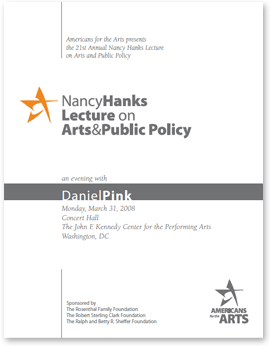About Daniel Pink:
Daniel Pink is a best-selling author and an expert on innovation, competition, and the changing world of work. In his latest book, A Whole New Mind, Mr. Pink charts the rise of right-brain thinking in mod-ern economies and explains the six abilities individuals and organizations must master in an outsourced and automated world. A Whole New Mind is a New York Times and BusinessWeek best seller and has been translated into 16 lan-guages. Mr. Pink’s first book—Free Agent Nation, about the rise of people working for themselves—was a Washington Post best seller that Publishers Weekly said, “has become a cor-nerstone of employee-management relations.” A free agent himself, Mr. Pink’s last real job was in the White House, where he served as Chief Speechwriter to Vice President Al Gore. He’s also worked as an aide to United States Secretary of Labor Robert B. Reich, as an eco-nomic policy staffer in the United States Senate, and as a legal researcher in India. Mr. Pink lives in Washington, DC, with his wife and their three children. He is now at work on his next two books, which will be published in 2008 and 2009.
About the lecture:
Nancy Hank served as president of Americans for the Arts (formerly the American Council for the Arts) from 1968 to 1969, when she was appointed chair of the National Endowment for the Arts, a position she served through 1977. During her eight-year tenure at the National Endowment for the Arts, the agency's budget grew 1,400 percent. Until her death 1983, Nancy Hanks worked hard to bring national prominence to the arts. The Nancy Hanks Lecture on Arts and Public Policy was established in 1988 to honor the memory of Nancy Hanks and to provide an opportunity for public discourse at the highest levels on the importance of the arts and culture to the nation's well-being.
Transcript of Daniel Pink's lecture, for the 21st Annual Nancy Hanks Lecture on Arts and Public Policy on March 31, 2008.


Most Commented